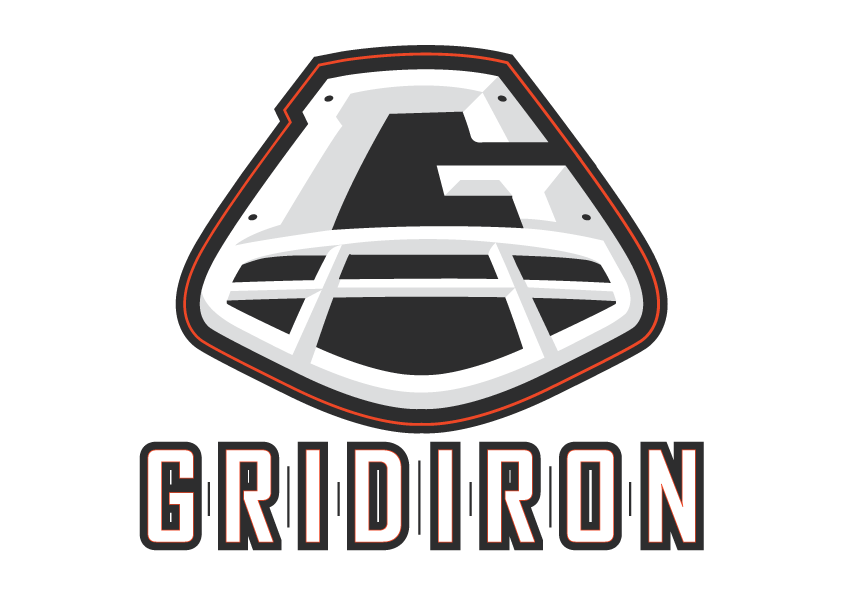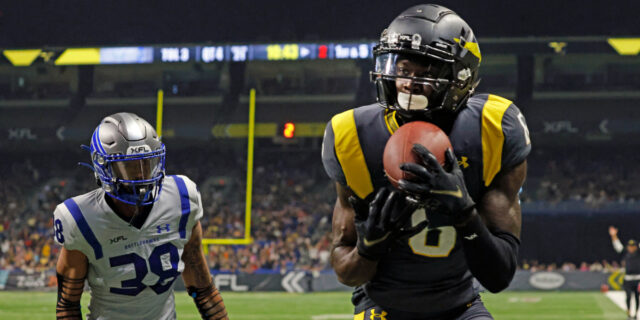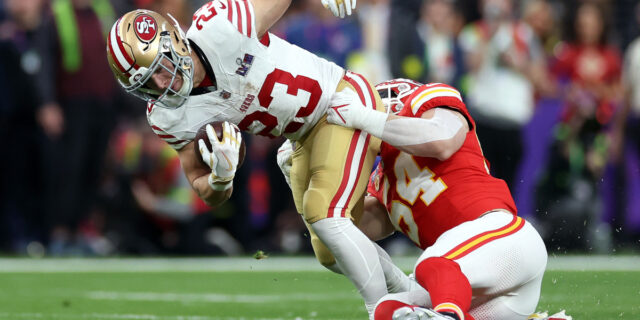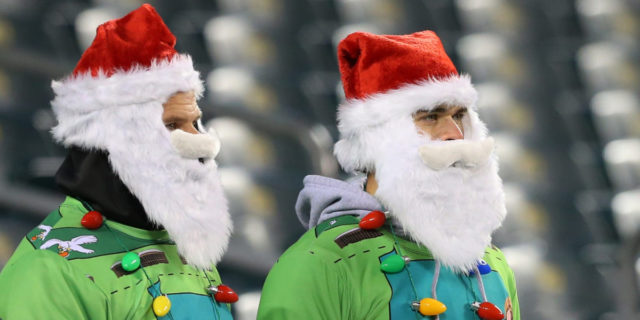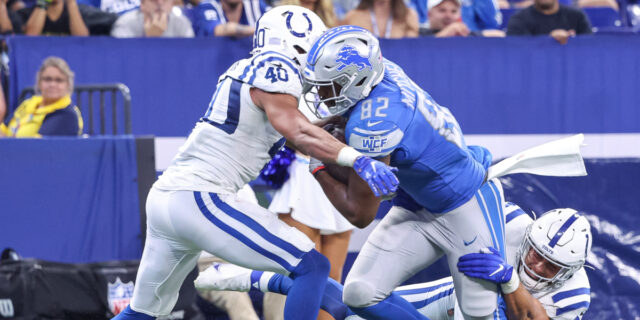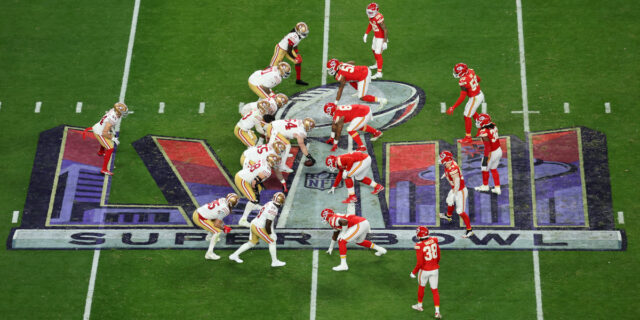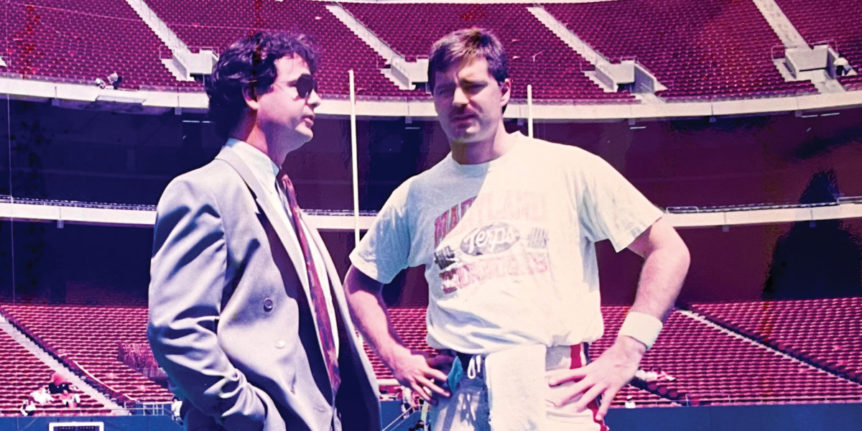
When Monarchs Ruled The World
This article originally appeared in Issue LXIV of Gridiron magazine, back in 2021 – for individual editions or subscriptions, click HERE
Billy Hicks raises his right fist and proudly shows Gridiron his 1991 World Bowl ring. “It’s mainly for you,” he explains with a smile from his home in Texas. “But I do wear it most days.”
Three decades on, his memories of that day are still as fresh as ever. The numerous post-game laps of honour, the repeated renditions of ‘We Are the Champions’, the thousands of fans lining the streets around Wembley to cheer the players’ bus and The Moody Blues singing ‘God Save the Queen’ at the post-game party in the West End. “If you ask any of the guys,” Hicks continues, “That’s probably one of the best memories they’ll ever have.”
For quarterback Stan Gelbaugh, the recollections of that victory and that season are equally vivid. “There’s no doubt I would never have played again had the World League not come along,” he tells Gridiron. “It was instrumental in my life; it changed my life.”
Gelbaugh could scarcely have imagined being part of such scenes five years earlier when he visited Wembley as a rookie with Dallas for the first American Bowl between the Cowboys and Chicago Bears.
Two weeks later, the sixth-round rookie was visited by Hicks. “Grab your playbook,” he was told. “Coach [Tom] Landry wants to see you.” Gelbaugh was cut and wound up in Buffalo, where he was signed and waived four times and never threw a regular season pass in four years.
At the start of the 1990s, Gelbaugh was selling photocopiers in Maryland and figured his professional football career was over. Then came an opportunity. Jim Haslett, a former Buffalo teammate he had befriended, had joined the coaching staff at the Sacramento Surge of the newly formed World League of American Football. Gelbaugh had never even heard of the WLAF, but the prospect of playing ball again in the California sunshine was appealing and so he headed down to Florida and declared for the supplemental draft. But after Sacramento selected a linebacker with their top pick, the quarterback was thrown a curveball when the London Monarchs drafted Gelbaugh. He got off the bus at the combine, turned around and was met by the man who had told him to grab his playbook in Dallas.
“There’s no doubt I would never have played again had the World League not come along.”
When Billy Hicks walked into the office of new Cowboys owner Jerry Jones on a Saturday morning in 1989, he was resigned to the fact his dream of becoming a general manager wasn’t going to be realised in Dallas. For starters, the young executive’s surname wasn’t ‘Jones’.
“You’re a good man,” Jones said, slapping Hicks’ leg. “And you’re a smart man!”
Hicks wanted to pursue an opportunity in Europe where the NFL’s owners – led by former Cowboys president and GM Tex Schramm – had approved a 90-day feasibility study on the possibility of staging an international football league. Jones not only gave his blessing, but paid Hicks’ salary for the final six months of that year.
That feasibility study soon turned into something more concrete, with Schramm giving Hicks the chance to be the GM of one of the three European teams – London, Barcelona or Frankfurt. Catalonia was appealing, but he recognised London was going to be the league’s big ticket. A press conference was held to unveil both Hicks and the Monarchs moniker. Less than five months later, on March 23, 1991, London were due to kick off the season at Wembley against the Frankfurt Galaxy.
“We didn’t have a place to practice, no players, I had to find a coaching staff,” Hicks explains. “I really had my doubts; in four and a half months, how are we going to do this?”
Catalonia was appealing, but he recognised London was going to be the league’s big ticket.
Larry Kennan was hired as the first head coach of the London Monarchs without ever meeting Hicks in person. Kennan had worked on the coaching staff with Al Davis’ Raiders so Hicks knew he would have the personnel knowledge to form a new team. He was also an offensive-minded head coach who wanted to air it out, which Hicks thought would excite the London fanbase. Finally, Kennan had a laid-back demeanour to shrug off complications like goal posts not arriving in London until two days before the first game, or Hicks needing to find a new chef because the players weren’t enjoying the food. “Offensive linemen losing weight is not a good thing,” he notes. “We had to find someone who knew how to cook a burger.”
Far from tearing them apart, the team of strangers bonded in their unique college-like environment at university halls in Bushey. They would play darts and eat shepherd’s pie at the Red Lion, and movie nights at Gelbaugh’s townhouse was a biweekly occurrence for the offense.
“You were all living together and got to know each other a lot better,” Gelbaugh explains. “I really look back on that as one of the best years in my life.”
When Gelbaugh sat down for his first team meeting with the Monarchs, it quickly became apparent he had landed in the perfect spot with Kennan too. The offense, bar a few run-and-shoot concepts, was a carbon copy of what he’d run in college at Maryland and for four years in Buffalo.
“I didn’t tell anybody,” he says with a chuckle. “I went out on the very first practice, started audibling and making calls at the line of scrimmage and they nicknamed me ‘Blueprint’ because they thought it took me one practice to learn the whole playbook! I could still get in the huddle and call those plays today.”
It was, therefore, perhaps unsurprising that Gelbaugh was outstanding in that 1991 season, when he was named the WLAF’s Offensive MVP. He threw for 2,656 yards, 17 touchdowns and had a passer rating of 92.8. Behind Gelbaugh’s arm and a defense that never gave up more than 21 points in a regular season game, the Monarchs went 9-0 before the Dragons spoiled their perfect campaign by winning 20-17 in the final week. However, after beating the New York/New Jersey Knights, the Monarchs would get their chance to exact revenge on the Dragons in the World Bowl two weeks later.
“I remember thinking ‘This is not how this is supposed to end’. But that didn’t last long.”
When receiver Dana Brinson fumbled the opening kickoff of World Bowl I and Barcelona took over at the Monarchs’ 18-yard line, the 61,108 in attendance could have been forgiven for believing this wasn’t going to be London’s day.
“I remember thinking, ‘This is not how this is supposed to end,’” Hicks admits. “There’s that little sinking doubt because that one loss was to Barcelona. But that didn’t last long.”
Still waiting to take the field for his first offensive series, Gelbaugh was not concerned. “It didn’t faze us; it pissed everybody off. I really felt like we were the better team top to bottom. If we just stuck to our gameplan, we were going to win. Very quickly it became obvious that was going to happen.”
The star of the show was safety Danny Crossman, who is now employed as the special teams coordinator for the London-bound Miami Dolphins. He would have three interceptions – one of which he returned to the house – as London coasted to a 21-0 victory. Judd Garrett, brother of ex-Cowboys head coach Jason, had 13 catches and snagged a touchdown.
“That three and a half hours – which really turned into five and a half hours – I’ll never forget,” Hicks says.
It was something that happened later that night which is still etched onto Gelbaugh’s mind today. At the post-game party, Tex Schramm took him over to meet a two-time Super Bowl-winning head coach and a man who had recently been enshrined in the Pro Football Hall of Fame.
“Shows you smart I was,” Tom Landry told the crowd as he shook hands with Gelbaugh, “I cut this guy!”
That World Bowl win proved to be the pinnacle for the Monarchs, who never made the playoffs again in their six-year existence. But for people like Gelbaugh – who spent another half a dozen years in the NFL – Hicks and the 20 former Monarchs who joined a Zoom reunion call earlier this year, it proved to have a lasting impact.
“It was, without doubt, my favourite season of football,” Gelbaugh concludes. “And I played 25 of them.”
This article originally appeared in Issue LXIV of Gridiron magazine, back in 2021 – for individual editions or subscriptions, click HERE
